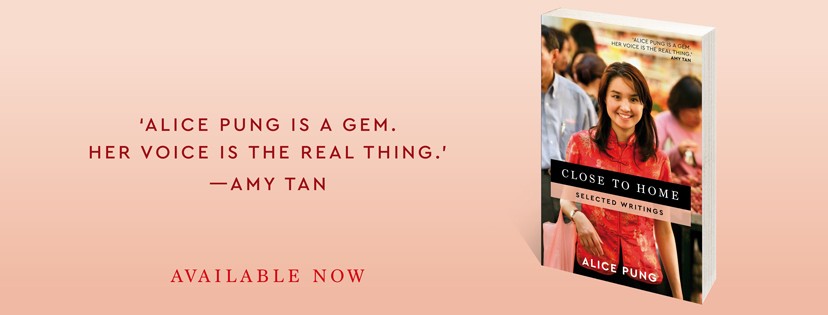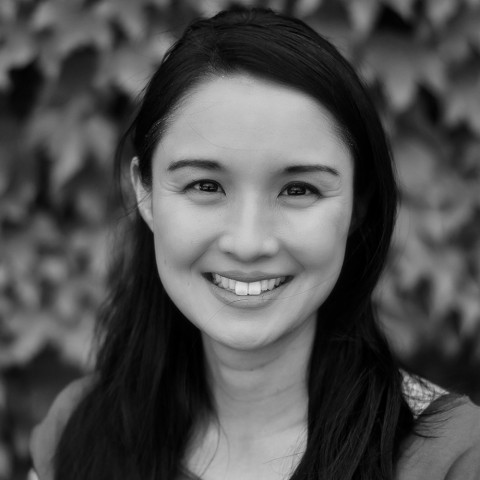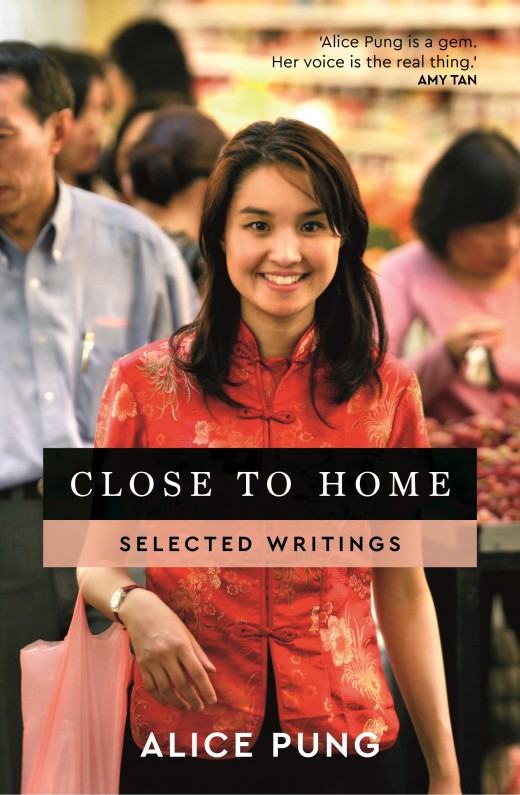News

News >
Extract: Chinese New Year Dragon
Read on for an excerpt from Alice Pung's collection, Close to Home.
‘We’re all going on a summer holiday!’ Tony Tran was singing again, with a chorus of bikini-clad girls swinging in the back- ground. There were about 120 of these girls, because he was standing in front of thirty TV sets at my family’s Retravision store in Footscray, and all the tellies were linked up to the same budget beach-scenes karaoke DVD. Tony’s sweeping arm actions brought out the best in his bling microfibre shirt. He often wore these shirts in substitute for our standard blue sales uniform. ‘No more working for a week or two,’ he crooned. Customers stopped to watch and applaud him. Salesmen stopped to watch the girls on the telly. And I stopped to adjust a store sign that was peeling from the heat.
We put signs up declaring the holiday season, but in our world, there were only three seasons: pre-sale, sale and stocktake. It was a Saturday afternoon in the middle of a Melbourne summer, and while our Australian customers were backpacking around China, I was busy unpacking boxes of cassette tapes made in China. Our less worldly friends spent their school breaks home-bound with their rear-projection TVs and icemaker fridges, their safe white-bread sandwiches. But there were dangers, our parents believed, for those poor kids alone in those massive suburban mansions. They would want to use the stove without adult supervision, and their pikelet dreams would turn into inextinguishable house-fire nightmares. There was nothing like the safety of the store.
During 30-degree days, my father set up his own demonstration outside the store to sell ice-shavers. We filled polystyrene cups with shaved ice, added a dash of cordial, and the dehydrated world hurrying past stopped to smile at us. This was like a lemonade stand, but better – we weren’t kids fundraising for new rollerskates, we were workers helping with serious business. As we grew older, we became sales assistants with our own name tags, our personalities pared down to one pithy, perked-up line: ‘How can I help you?’
‘Excuse me.’
I looked up from the half-sliced box of cassettes and saw a small Asian woman with a smile like a slice of watermelon. ‘Microwave broken.’
All customers around this neighbourhood communicated with an essential efficiency – almost no words and all action.
The lady pointed to a receipt in her hand. ‘I want buy new microwave.’ She pointed to the model number on her receipt. ‘Same that one.’
‘But your microwave’s still under warranty,’ I told her. ‘We can fix it – for free.’
‘No good have anything broken for the New Year,’ she told me. ‘Bring bad luck.’
During the time before Chinese and Vietnamese New Year in late February, customers often bought new water urns, kettles and rice cookers, even if their old ones were still under warranty. My mother told me that back in Cambodia, during New Year, the whole community stopped working to visit each other. They were the happiest times of her life, she said, because she would get a new set of clothes every year. But when your family owns an electrical appliance store that operates seven days a week, the only way you notice the arrival of Chinese New Year is in the increase of white-goods purchases.
You know Christmas has come when the Sunbeam Corporation sends a gigantic white bear in a beanie and scarf, to be raffled off to customers. And you can tell summer has arrived not from the vision of heat outside, but by the box of bright Hawaiian shirts sent by Retravision head office for our summer promotional uniform.
Working hours were not kind to cultural celebrations, particularly when we were competing with the hi-fi megastore down the road. But at least we still got new clothes, even if the shipment didn’t always arrive in time and Tony Tran had to improvise with his own glossy attire.
During the school holidays, our family spent quality time working together, surrounded by an eccentric everyday cast of hundreds. There was a man with a watering can who went around watering the money trees near the front doors of the stores so that the businesses would thrive. We always gave him a tip. There was also a carpet-cleaner salesman who scrubbed his detergents on shop carpets in strategic places. If the store owners didn’t buy the cleaning liquids, they’d be left bewildered at the huge smiley face scrubbed into their carpets, showing up the years of grime.
Unlike a conventional electrical-goods franchise, we also sold appliances that distinctively appealed to the Asian diaspora: Tiger rice cookers, deluxe ‘Rolls Royce’ automated toilets and electronic English–Vietnamese dictionaries. In fact, there were so many little things to buy in this town that, as children, we rarely even thought of wanting bigger things. After school, instead of coming back to watch one TV, we’d watch twenty in a row, and sometimes be joined by the children of customers, who’d squeal when they were dragged away by one arm from Captain Planet.
‘Everybody has a summer holiday, doing things they always wanted to!’
Tony Tran was in such a good mood because that morning we’d been visited by the Chinese New Year Dragon. Puppeteered by four young men from the local dance troupe, its arrival through the shopping strip was heralded by drums, cymbals and fire- crackers. Most of the migrant inhabitants of this neighbourhood had escaped from some war or another, so you might think they’d hide with hands over their ears when they heard the racket. But no, they wanted small business to be blessed with prosperity by a creature whose arrival was hailed by a series of machine-gun sounds. The exploding noise of the firecrackers would scare away evil spirits, and the staff sought out the mouth of the dragon to slip in lucky red envelopes of money: an innocuous bribe against the sway of the superstores.
‘No, sorry mate, unfortunately the karaoke DVDs are not included,’ Tony Tran said, as he carried the DVD player he’d sold to the register. His customer asked him something else. ‘No, sorry mate, I can’t burn you a copy here either. How about I give you a New Year’s present? How about this t-shirt?’
The customer seemed quite pleased with his Electronic Soya-Milk Maker t-shirt.
Once a year, right in the middle of summer, when other Australians were at the beach getting tanned, the carnival materialised right in front of our shop. Whole streets were blocked off in the Footscray central business district and Luna Park came to us, complete with the upside-down machines and spinning teacups. Retailers would set up small tents to advertise their stores or sell Vietnamese CDs; street vendors would grind sugarcane to sell as drinks, or roast pork balls and corn.
My father promoted mobile phone deals in a little hired tent down the street, my aunties and I staffed the shop, and an assort- ment of small cousins and siblings would loiter about waiting for us to finish work and take them to the revelry.
We finally closed shop and stepped outside. A different world emerged, populated by brown and yellow faces in wide-brimmed hats to ensure that no tan would reach South-East Asian skin. (For the older women, the anaemic aristocrat look was always the fash- ion.) Our mayor made the usual speech about multiculturalism that no one under the age of twenty-five listened to because they were too excited waiting to see the local South-East Asian version of the Backstreet Boys.
These boys were good, and what was even better was that they often crooned Carpenters hits. They dressed in matching polyester shirts and sang about being on top of the world. We passed Tony Tran in the audience, getting ready to groove, with a skewer of barbequed octopus in one hand.
People gave him a wide berth.
We passed my father in his tent, packing up brochures. He handed us a roll of tickets to the rides. ‘Use all these up tonight,’ he instructed. The rides had come into our town from the Springvale festival, and next weekend the New Year’s celebrations would move to Richmond. As I sat with my sisters on the ferris wheel over Footscray, I looked down to my world peopled with colour and realised there was no need to paint this neighbourhood red. Firecrackers in the morning, a dragon through the store in the afternoon and a carnival in the evening – you could live your whole life in a town, but your world would still be filled with small wonders.
Close to Home is available now. Click here for more details.
Share this post
About the author
Alice Pung OAM is an award-winning writer based in Melbourne. She is the bestselling author of the memoirs Unpolished Gem and Her Father’s Daughter, and the essay collection Close to Home, as well as the editor of the anthologies Growing Up Asian in Australia and My First Lesson. Her first novel, Laurinda, won the Ethel Turner Prize at the 2016 NSW Premier’s Literary Awards. One …
More about Alice Pung




